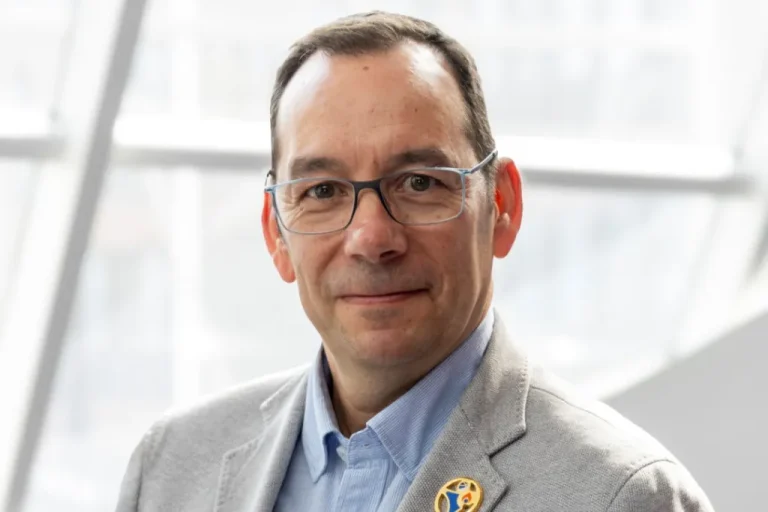A high-profile nurse leader from Spain, who has been elected to lead the International Council of Nurses (ICN) for the next four years, has spoken to Nursing Times about his priorities and areas of greatest concern for the profession.
Dr José Luis Cobos Serrano was formally announced as the ICN’s new president today at the organisation’s 2025 congress, which is taking place in Helsinki, Finland.
“We need to have the right staffing level… but we [also] need to know what our population needs”
José Luis Cobos Serrano
A registered nurse in Spain for more than 30 years, Dr Cobos has worked across several areas of practice including intensive care, surgery and primary care.
He was elected to the president post by members of ICN’s Council of Nursing Association Representatives, which includes nurses from 137 countries.
Dr Cobos succeeds US nurse leader and academic Dr Pamela Cipriano, who has served as ICN president since 2021.
After having worked as a frontline nurse, Dr Cobos took on local and regional nursing leadership posts.
However, speaking with Nursing Times via an interpreter, Dr Cobos said it was “difficult” to make changes at this level.
From around 2001, he moved into research and regulation roles, including leading a project at the Spanish General Council of Nursing helping to standardise professional practice in Spain, overseeing a team of 5,000 researchers across the country.
“That was my first big challenge in terms of research,” he said.
“I then continued to work with the [council]. I worked at the hospital and at the Spanish council at the same time.”
He achieved his PhD at the University of Madrid and took up director roles leading nursing research institutions.
Meanwhile, he said his national work led him to advising on healthcare policies and being involved with work on nurse prescribing.
“I realised how important consensus was, and how [important] striking a balance was,” he said.
“I… always found all that behind the scenes, I knew how the political element worked. It is quite complex. You have to learn how to talk with politicians, with ministers.”
In 2019, he was appointed deputy secretary general of the Spanish General Council of Nursing and in 2021, became the organisation’s vice president. That same year, he joined the ICN board of directors.
ICN presidents typically choose a ‘watchword’ to categorise the type of work they wish to pursue in their tenure.
Outgoing president Dr Cipriano chose “influence”, indicating her wish to sway policy at an international level among organisations such as the Untied Nations (UN) and the World Health Organization.
Dr Cobos has chosen “empowerment”.

Jose Luis Cobos Serrano at ICN 2025
Explaining why, he said: “It is significant at different levels. On the one hand… ICN has to be empowered in the face of international organisations; the UN, for example, [or] the International Labour Organisation.
“Why is that? Because we believe we have to continue to raise the voice of nurses so that they are involved in healthcare policies.
“And I’m going to request this to politicians every time I have the opportunity.”
Dr Cobos said he also wished to empower national nursing associations and nurses themselves, adding: “We have to use all their potential… [but] society is not benefiting from [it], because healthcare systems are not using all the potential of nurses to benefit patients.”
He said, however, that he wished to continue the “roadmap” laid out by his predecessor.
Asked what he thinks the ICN should be prioritising, and what he considered to be the biggest challenges nurses across the globe face, Dr Cobos pointed to the findings of the second State of the World’s Nursing report, published last month.
In particular, Dr Cobos said a “lack of nurses” and workforce composition was an issue that all countries faced, though warned against “talk[ing] only about quantity”.
“I would like every nurse to think that they have to make their own contribution”
José Luis Cobos Serrano
He said: “We need to have the right staffing levels – patients [compared to] number of nurses – but we [also] need to know what our population needs…
“We see the ageing population. The more you age, the more chronic illnesses you have, and therefore we have to change the way we think [and] the way we have to take care of people.
“We have to change the paradigm of healthcare, we have to go from healing to caring. Why is that? Because the focus will be on chronic illnesses.
“What do they need? They need care. We’re not going to heal them, we will take care of them.”
He also echoed other concerns raised in State of the World’s Nursing, such as the impact of inequitable nurse migration agreements, labour conditions and the suffering of nurses in conflict zones.
Dr Cobos further said that he hoped the profession would look to the ICN for leadership, and he wanted to facilitate the contributions of all nurses.
“I would like every nurse to think that they have to make their own contribution. They cannot stay sitting in a chair saying: ‘What can ICN do for me?’ It is: what can you do for nursing?
“We all have to make our own contribution in order to improve the situation.”
Dr Cobos formally assumes his president role this weekend, at the inaugural meeting of ICN’s new board.
He will join the other newly-elected, and re-elected members, including Dr Emily McWhirter, associate director of the Royal College of Nursing’s Leadership Academy.

